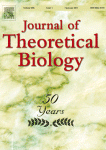 Authors: Segismundo S. Izquierdo, Luis R. Izquierdo, and Fernando Vega-Redondo
Authors: Segismundo S. Izquierdo, Luis R. Izquierdo, and Fernando Vega-RedondoTitle: The option to leave: Conditional dissociation in the evolution of cooperation
Source: Journal of Theoretical Biology
Abstract: Conditional dissociation, i.e. the option to leave an interacting partner in response to his behaviour, is a mechanism that has been shown to promote cooperation in several settings, but the fundamental features that make conditional dissociation work in this way are not yet fully understood. This paper identifies some of the key conditions that make conditional dissociation lead to high levels of cooperation, explains how this mechanism can support the evolutionary coexistence of cooperative and non-cooperative behaviour typically observed in nature, and provides an analytical formula to estimate the expected degree of cooperation thus achieved. Our model involves a population of individuals who are paired to play an iterated prisoner's dilemma. All individuals share the same capacity to react to the action previously chosen by their partner and, without any other a priori constraint or exclusion, they may use any behavioural rule that is compatible with this capacity. The dynamic evolution of the population eventually enters either a non-cooperative or a partially cooperative regime, depending mainly on the expected lifetime of individuals. Whenever the partially cooperative regime materializes, the cornerstone of its long-run stability is the coexistence of defectors and "Out-for-Tat" strategists, the latter being those who start cooperating and respond to defection by merely leaving. We find, therefore, that conditional dissociation is the essential disciplinary device supporting cooperation, whilst other conditional strategies (such as Tit-for-Tat) remain present only in small population shares. These conclusions are obtained both by extensive numerical simulations and through analytical mean-field methods that approximate the stochastic simulation dynamics and deliver accurate predictions for general parameter configurations.
Recommended citation:
Izquierdo, S. S., L. R. Izquierdo and F. Vega-Redondo, 2010. "The option to leave: Conditional dissociation in the evolution of cooperation", Journal of Theoretical Biology, 267 (1), pp. 76-84
Further articles






